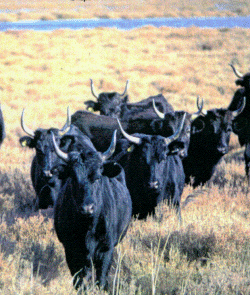 The James Hutton Institute
The James Hutton Institute
This page is no longer updated. The Macaulay Land Use Research Institute joined forces with SCRI on 1 April 2011 to create The James Hutton Institute.
 |
Workshop 3: Viable livestock systems for positive environmental management in disadvantaged regions. Parc Naturel Tour du Valat, Arles, France. 6-7th March 1998 |
The areas of Europe that are characterised as "less-favoured" under the Common Agricultural Policy (CAP) contain a large proportion of those landscapes and wildlife habitats that are most valued by the people of Europe and that are of the highest importance for nature conservation and biodiversity.
There is increasing pressure to shift the emphasis of agricultural subsidy to encourage farming systems that are, as well as being profitable, more benign in their environmental effects. Grazing livestock, a sector of great economic importance in many of the LFAs, play a key role in the management of a range of biologically important vegetation types, such as upland permanent pastures, chalk downland, marshes and watermeadows. In more southerly regions, particularly sheep and goats are important for maintaining structural and biological diversity in maquis - type scrubland and for reducing the risk of bush fires.
Within the context of areas managed specifically for the conservation of nature, the necessary practices are relatively straightforward to implement, and there is a considerable body of experience and research literature in this field. In comparison, the integration of commercial livestock production with the pursuit of environmental objectives raises many formidable problems.
Such integration is however necessary in the development of viable new systems, and it is the purpose of this workshop to identify some of the priority areas in which research may contribute to this process. It is envisaged that there are three main research fields that deserve attention, and between which there is much scope for interdisciplinary collaboration:
1. Integrating conservation objectives into viable animal production
systems.
Ecological and agricultural research to address the technical problems of
reconciling the pursuit of commercial agricultural activities with the
conservation of nature.
2. Policy in practice - assessing the implications of livestock and
agri-environmental policies for the environment in LFAs
Policy and environmental research that contributes to the understanding of the
relationship between policy and practice by assessing the effects that
livestock and agri-environmental policies have on farming systems and hence
their environmental consequences.
3.Marketing of environmental management
Economic research to establish ways in which the environmental management role
of livestock systems can be exploited to provide additional income, for example
through the sale of higher quality products, or, on a regional level, improving
tourism revenues.
The 3rd LSIRD workshop will identify areas of research required to enable European LFA livestock systems to respond effectively to EU agri-environmental policy, and to deliver positive landscape and habitat and "sustainability" benefits, while maintaining overall farm profitability.
It is
becoming increasingly clear as the series of workshops moves on towards its
conclusion in Metsovo in July, that there is considerable degree of consensus
developing between researchers from all parts of the EU on the need for a
special approach to the development of farming systems in the LFAs. These
areas, in which agricultural activity is marginal, are also highly valued
landscapes, particularly significant for nature conservation and outdoor
leisure activities. It is essential that this context is taken into
account in the development of future policies to support agriculture in these
regions, recognising agriculture as an integral activity within the range of
land uses in the LFA. Farming is important for employment, both on farms
and in ancillary industries, but it is also central to the maintenance and
development of landscapes, the maintenance of biodiversity, and indeed in
defining the cultural identity of a region. This third
workshop, held at the Tour du Valat research centre near Arles, looked at the
relationship between livestock farming and landscape/ habitat management and
the implications of agri -environmental policies for the future research needs
of livestock farming in the LFA.
The programme for the one-day meeting concentrated on three main areas:
Integrating conservation objectives into viable animal production systems;
Policy in practice: assessing the implications of livestock and
agri-environmental policies for the environment in LFAs; and
"Marketing" environmental management. These sections reflect
the main areas of research necessary to address the constraints on animal
production systems which will deliver sound environmental management.
Appropriate environmental management should be an integral part of a production system. Grazing strategies should balance the need for productivity against achieving an appropriate level of biodiversity for a specific site. This objective, which is closely linked with the need for more sustainable agriculture, should be strongly encouraged by the policy framework within which LFA farmers operate. The workshop heard examples from France, Austria and Spain of projects that are addressing the practical obstacles to establishing, or maintaining high environmental value farming systems. Policy plays a crucial role in the economics of farming in the LFAs and has a fundamental influence on the production systems that are used there. Three papers, from France, UK and Greece assessed the relationship between policy and practice in different regions.
Extensive farming systems generally will return a lower output per unit of land than more intensive systems. This requires that, in order to maintain viability, it is important for all the available opportunities for increasing the value of the products. Organic farming is an example of a marketing scheme that has achieved success in some sectors in increasing product values on the basis of their production system. There is also in some areas considerable potential for exploiting regional images (attractive landscape, low pollution, traditional farming/ food manufacturing etc.) to add value to products arising from livestock systems in the LFA. The workshop heard presentations by two workers from France of projects that were aiming to improve the marketing of products from livestock reared extensively in nature reserves.
The Tour du Valat research centre is specifically dedicated to the study
of land management for nature conservation in the Camargue river
delta. The workshop concluded with a field trip to see some of the key
sites in the delta, where grazing by “taureaus” destined for
the bull ring is used to control vegetation in the periodically flooded lakes,
temporary home to a vast number of migratory birds.